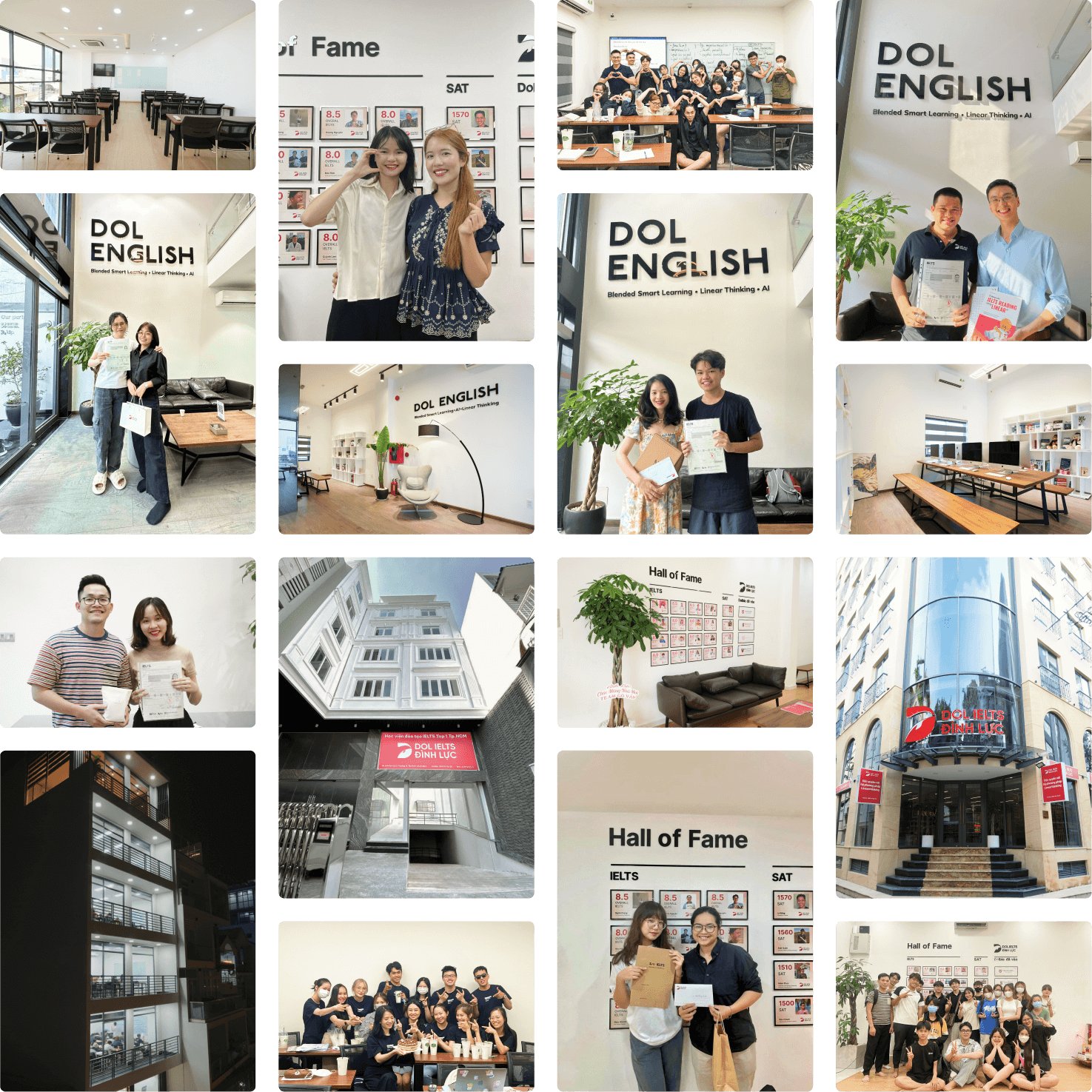IELTS Writing Task 2 chủ đề Money and Business kèm vocab
Money and Business là chủ đề khá mới mẻ với nhiều thí sinh và vì vậy gây ra không ít khó khăn cho thí sinh khi trả lời những câu hỏi liên quan tới chủ đề này trong Writing Task 2. Bài viết dưới đây sẽ phân tích topic Money and Business thành những topic nhỏ, đồng thời cung cấp từ vựng và ideas cụ thể cho từng subtopics theo đúng với tư duy Linearthinking.
DOL IELTS Đình Lực
Nov 08, 2021
2 mins read

Table of content
🗒️
💡
📚
Đề bài - Topic 2
Bài mẫu - Sample Essay
✍️
🗒️ Các subtopic thường gặp và đề bài
Khi nhắc tới Money and Business, thông thường thí sinh rất dễ bắt gặp những câu hỏi đề cập tới các subtopics như:
Large, international business
Buying cheaper products
Family-run business
The impact of technology on business
The importance of skill and knowledge in business
Materialism and Consumerism
Một vài đề thi tiêu biểu liên quan tới các subtopic trên có thể kể đến:
Topic 1:
Some international companies are very powerful now and many people believe that it is a negative development.
Do you agree or disagree with this statement? Give your reasons and relevant examples.
Topic 2:
People in the community now could buy cheaper consumer goods.
Do the advantages outweigh the disadvantages?
Topic 3:
Some people think that universities should provide graduates with the knowledge and skills needed in the workplace. Others think that the true function of a university should be to give access to knowledge for its own sake, regardless of whether the course is useful to an employer.
What, in your opinion, should be the main function of a university?
💡 Idea và từ vựng theo subtopic
Đi sâu vào từng subtopic, các ideas và vocab cho những subtopics này có thể được sắp xếp theo Linearthinking theo mô hình tư duy Advantages - Disadvantages
Tìm hiểu thêm về cách học vocab theo tư duy Linearthinking tại đây.
POSITIVE/ FOR | NEGATIVE/ AGAINST | |
Large, internati-onal business | - produce goods and products in large quantities => lower product prices and standardise manufacturing procedures => provide quality products at more reasonable prices (sản xuất hàng hoá với số lượng lớn => giảm giá thành sản phẩm và chuẩn hoá quy trình sản xuất => sản xuất nhiều sản phẩm với giá thành phải chăng hơn) - establish branches in developing countries => create more job opportunities for local people + pay taxes to the local authorities => promote economic development (thành lập chi nhánh ở các quốc gia đang phát triển => tạo thêm nhiều cơ hội việc làm cho người địa phương + đóng thuế cho chính phủ => phát triển kinh tế) | - large companies have more resources => invest more money in advertising their products => local companies cannot compete => monopoly (công ty lớn có nhiều nguồn lực hơn => đầu tư nhiều tiền vào quảng cáo sản phẩm => công ty tư nhân không thể cạnh tranh => độc quyền) |
Buying cheaper products | - customers can purchase more products from their source of real income => increase in consumer spending => push the healthy growth of a nation’s GDP (Khách hàng mua sản phẩm từ chính thu nhập của mình => tăng sức mua của khách hàng => thúc đẩy phát triển GDP quốc gia) - businesses can expand their market towards low and medium income groups => more new customers are attracted to a lower price point => boost sales and growth of the company (doanh nghiệp mở rộng thị trường tới nhóm người thu nhập vừa và thấp => nhiều khách hàng bị thu hút bởi giá thành thấp => tăng doanh thu và sự phát triển của công ty) | - encourage businesses to prioritize production expense reduction => companies seek less expensive and less qualified sources of materials => the quality of the products is compromised => consumers receive less value from their purchase (khuyến khích doanh nghiệp ưu tiên giảm chi phí sản xuất => công ty tìm kiếm nguồn vật liệu rẻ và chất lượng kém hơn => chất lượng sản phẩm giảm sút => khách hàng nhận sản phẩm chất lượng thấp) - customers associate quality with price => frequently lowering the price leads to the brand being perceived as low quality => lose customer loyalty and thus the market share (khách hàng nghĩ chất lượng liên quan tới giá tiền => thường xuyên giảm giá khiến thương hiệu bị xem là kém chất lượng => mất sự trung thành của khách hàng và thị phần) |
Family-run business | - older generations pass down their traditional jobs to the younger generations => maintain these traditional jobs => preserve cultural characteristics (thế hệ trước truyền lại nghề truyền thống cho thế hệ trẻ => giữ những công việc truyền thống => giữ bản sắc văn hoá) | - some families force their children to follow their profession => these children cannot do what they want => have a lower performance at work and be more likely to quit (một vài gia đình bắt con cháu theo nghề nghiệp của họ => con cháu không được làm những gì họ thích => làm việc tệ hại và dễ nghỉ việc hơn) |
The impact of technolo-gy on business | - technology allows companies to reach customers abroad => find more potential clients => increase their revenues (công nghệ cho phép công ty tìm khách hàng nước ngoài => tìm khách hàng tiềm năng => tăng lợi nhuận) - companies can hold meetings online => employees can save time and money commuting + tackle problems immediately (công ty có thể họp trực tuyến => nhân viên tiết kiệm thời gian và tiền bạc di chuyển + giải quyết vấn đề ngay lập tức) | - bad security system => hackers steal important information from the company => sabotage the company (hệ thống an ninh yếu kém => tin tặc đánh cắp thông tin quan trọng từ công ty => chơi xấu công ty) |
The importa-nce of skill and knowled-ge in business | Skill is more important (Kỹ năng quan trọng hơn) some professions require good communication skills => Example: jobs in the customer service sectors => help avoid conflicts and build rapport with customers. (một vài nghề nghiệp đòi hỏi khả năng giao tiếp tốt => Ví dụ: nghề nghiệp trong ngành chăm sóc khách hàng => giúp tránh mâu thuẫn và xây dựng mối quan hệ thân thiết với khách hàng) | Knowledge is more important (Kiến thức quan trọng hơn) some professions require in-depth knowledge => Examples: teachers, doctors, engineers… => explanation: without knowledge, doctors may make fatal mistakes when performing surgery on patients (một vài ngành đòi hỏi kiến thức sâu => Ví dụ: giáo viên, bác sĩ, kĩ sư... => Giải thích: nếu không có kiến thức, bác sĩ phạm phải sai lầm chết người khi phẫu thuật lên bệnh nhân) |
Material-ism and Consum-erism | - companies employ competitive pricing strategies => attract more customers and expand market share => increase (công ty có giá cả cạnh tranh => thu hút nhiều khách hàng và mở rộng thị phần => tăng lợi nhuận) - rising demand for certain consumer products => companies are required to increase output and production => need to take on more staff => generate more work opportunities (tăng nhu cầu cho một vài sản phẩm tiêu dùng => công ty bắt buộc phải nâng cao sản lượng => cần nhiều nhân lực hơn => tạo ra cơ hội việc làm) - customers are actively looking for the next-best products to buy => manufacturers are under constant pressure to innovate => technological innovations and creativity are boosted => push the living condition higher (khách hàng muốn tìm kiếm nhiều sản phẩm để mua hơn => nhà sản xuất chịu áp lực phải cải tiến => thúc đẩy nhiều phát minh công nghệ và trí sáng tạo => nâng cao chất lượng cuộc sống) | - many manufacturers are forced to cut cost => use low-end materials to create more goods => reduce the quality of the products => increase consumer dissatisfaction (doanh nghiệp bị bắt phải cắt bớt chi phí => dùng vật liệu giá rẻ để tạo thành hàng hoá => giảm chất lượng sản phẩm => khách hàng ngày càng không hài lòng) - consumers make purchase to reaffirm social status => widen social gaps and breed discontent and even conflicts (khách hàng mua sản phẩm để khẳng định vị thế xã hội => mở rộng vòng tròn xã hội và gây ra sự không hài lòng và mâu thuẫn) - increasing demand for consumer goods => put extensive pressure on natural resources needed for manufacture => lead to environmental degradation => wreak havoc on the natural ecosystems (Tăng nhu cầu sản phẩm => gây áp lực nặng nề lên nguồn tài nguyên cần để sản xuất => dẫn tới suy thoái môi trường => gây hại tới hệ sinh thái) |
📚 Bài mẫu
Cùng quan sát thử một bài viết mẫu thuộc chủ đề Money and Business, áp dụng các ideas và từ vựng IELTS Writing task 2 trong bảng tổng hợp phía trên nhé!
Đề bài - Topic 2
People in the community now could buy cheaper consumer goods.
Do the advantages outweigh the disadvantages?
Bài mẫu - Sample Essay
It is possible for people to purchase goods at a cheaper price. While I believe this trend can bring concerns about product qualities, I still believe the benefits far outweigh the disadvantage.
On the one hand, cheaper products are questionable in terms of their quality. In fact, to reduce the price of products, businesses are encouraged to prioritize production expense reduction. As a result, companies seek less expensive and less qualified sources of materials and the quality of the products is therefore compromised. This explains why consumers may feel like they receive less value from their purchase because the product is no longer of high quality. However, this drawback can be easily avoided if customers do research into the product’s company before making any purchase.
The benefits of having cheaper options, on the other hand, far outweigh the aforementioned drawbacks. The first benefit is that customers can purchase more products from their source of real income, which can enhance the purchasing power of the economy. This in turn increases consumer spending and pushes the healthy growth of a nation’s GDP. In addition, businesses can expand their market towards low and medium income groups, more new customers are attracted to a lower price point. This can help boost sales and growth of the company.
In conclusion, while I agree that cheaper products may have lower quality, I also believe this drawback is not as significant as the benefits that these products bring to manufacturing companies and the economy as a whole.
✍️ Luyện tập thêm
Qua bài viết trên, các bạn đã nắm được những subtopics phổ biến trong chủ đề Business and Money cũng như những ý tưởng về từ vựng hay cho các subtopics này. DOL hy vọng bạn sẽ có được nguồn tài liệu tham khảo chất lượng trong quá trình luyện thi IELTS của mình. Cùng luyện tập thêm với những đề thi IELTS gần đây nhất tại kho đề IELTS Task 2 của DOL nhé!
Table of content
🗒️
💡
📚
Đề bài - Topic 2
Bài mẫu - Sample Essay
✍️
